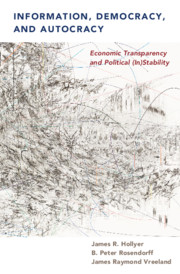PART II - POLITICAL (IN)STABILITY
Published online by Cambridge University Press: 17 September 2018
Summary
More than petards or stilettoes, therefore,words – uncontrolledwords, circulating freely, underground, rebelliously, not gotten up in dress uniforms, uncertified – frighten tyrants. But sometimes it is the official, uniformed, certified words that bring about the revolution.
Ryszard Kapuscinski, Shah of Shahs (1985: 103)Survival – as the goal of political leaders – has become a canonical assumption in political science. Just as economists assume that individuals seek to maximize the utility associated with consumption (and firms, profits), political scientists often assume that governments seek to survive in power. Whether they do so by winning elections, by paying off an inner circle of elites, or by quelling the masses through fear,we assume that all governments share this common goal of surviving in power. There are, of course, exceptional leaders throughout history who have voluntarily stepped down from power, including Presidents George Washington (1797) and Nelson Mandela (1999) (see Cogley 2013). We treat such exceptional leaders as deviations from the rule.
How does transparency impact the survival of political leaders? We contend that the answer depends crucially on political institutions. As argued by Bueno de Mesquita et al. (2003), political institutions shape the very logic of political survival. Autocrats typically depend on the loyalty of key inner-circle elites to maintain power – mass unrest does not often take down an autocrat because collective action problems typically hinder threats to their rule from below. Indeed, tight control of information helps keep the masses at bay. Under democracy, by contrast, elections enable the masses to express their will. In order to survive in power, democratic governments must win over and maintain the support of the masses by winning regular elections. Autocratic and democratic leaders face different threats and opportunities from changes to the informational environment.
Part II explores the logic of how the informational environment impacts the likelihood of political survival under autocracy and, alternatively, under democracy. We maintain our focus on the dissemination of data on aggregate economic outcomes, specifically looking at how this form of transparency impacts the decisions of average citizens to continue to support or oppose political leaders and regimes. In these three chapters, we emphasize how the informational environment impedes or enables collective action.
- Type
- Chapter
- Information
- Information, Democracy, and AutocracyEconomic Transparency and Political (In)Stability, pp. 89 - 91Publisher: Cambridge University PressPrint publication year: 2018



